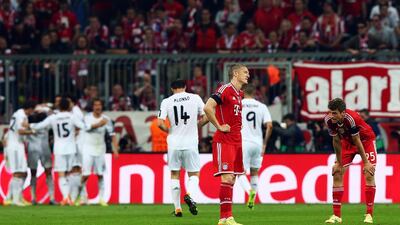Across the leading leagues of Europe, reigning champions are stumbling.
Atletico Madrid have slipped seven points off the summit of the Primera Liga.
Manchester City see the same gap stretch ahead of them in England, while Paris Saint-Germain are two places shy of the top place in France’s Ligue 1 they have come to regard as their right, in recent years.
Only in Italy, where Juventus canter towards a fourth successive championship, and Germany, where Bayern Munich are back thumping other members of the Bundesliga after recent slip-ups, does the defence of last year’s title seem assured.
Variety at the very top animates the best club competitions. And the very best of them is the Uefa Champions League, which emerges from its winter break on Tuesday night.
The winners may be drawn from a limited pool of candidates, but they are almost never the same from one year to the next. No club has retained the European Cup since 1990.
That is a full eight years before Martin Odegaard, an intriguing January addition to the squad of the holders, Real Madrid, was born.
Many older participants than him can testify to how difficult it is to lift the trophy two years in succession.
Ask Paulo Sousa, coach of the Basel team who take on Porto. His answer is that the only way to do it is to keep switching clubs.
As a player, Sousa won the 1996 competition with Juventus and then was a member of the Borussia Dortmund side who upset predictions by beating Juve 12 months later.
Or ask Pep Guardiola, who takes his Bayern Munich to Lviv, to meet a Shakhtar Donetsk side displaced by war but still capable of spirited football.
Guardiola is seeking a third Champions League title as a coach. His Bayern side are among the favourites.
But Guardiola has been in charge of favourites before.
His Barcelona were that in 2010, when their defence of the crown was interrupted by Inter Milan.
So were his Bayern last season, when, as holders, they suffered a devastating four-goal thrashing by Real Madrid at Munich in the semi-final.
Bayern put eight goals past Hamburg on Saturday, and although Guardiola frets over the length of an injury list that includes Philipp Lahm, Thiago Alcantara, Javi Martinez and a recovering Xabi Alonso, he has a squad of ample depth to negotiate the tie against Shakhtar and beyond.
Franck Ribery returned from his lay-off against Hamburg and scored, demonstrating his readiness to compete for one of the attacking positions alongside Arjen Robben, Mario Gotze, Thomas Muller and Robert Lewandowski.
That sort of depth will be envied by Carlo Ancelotti, the coach of defending champions Real Madrid.
His side travel to Germany to play Schalke, with injury problems affecting several of their first-teamers.
A compelling run of form in late 2014 has given way to several patchy displays and concerns about the well-being of Cristiano Ronaldo.
Madrid may not need to turn to Odegaard, the 16-year-old Norwegian, quite yet, but they must play more fluently than they have in the last six weeks if they are to add an 11th European Cup immediately after their 10th.
Of the first batch of games, Chelsea’s trip to PSG will claim the most attention, the meeting of two clubs who have been transformed by huge investment since the turn of the millennium, into superpowers capable of adding more variety to the European Cup’s shifting roll of honour. Like Madrid, PSG have a badly timed spate of injuries, with four picked up in Saturday’s 2-2 draw with Caen. Laurent Blanc lamented those injuries and the fact that Jose Mourinho’s Chelsea enjoyed a weekend off, thanks to their early FA Cup exit against Bradford City, and have had 10 days to prepare for the Parisians.
“Mourinho is a genius for having organised that,” said Blanc, only half-joking.
What Mourinho does know is that rest days are at a premium now, and that stamina and a deep squad matter from here until June.
sports@thenational.ae
@ For more UEFA CHAMPIONS LEAGUE news visit thenational.ae/topics


